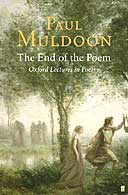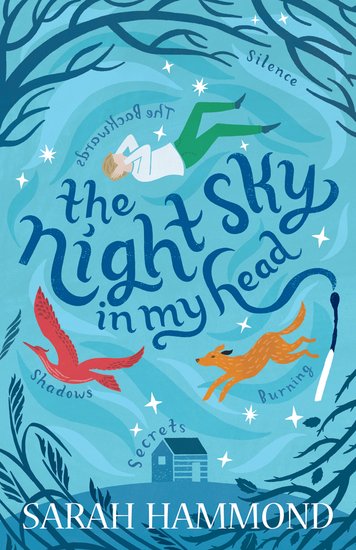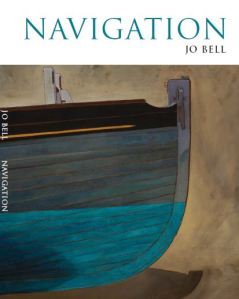It has been a while now since Roland Barthes declared the 'death of the author', liberating literary criticism from the quest to reconstruct what the author 'really meant' or to uncover the hidden meaning of the text in her or his biography, but poetry like any other art form is intrinsically bound up with the facts of the maker's life, at least from the reader's point of view. Would any reader really approach Plath or Larkin without wanting to find out something about who they were, even if that only went as far as tapping their names into Wikipedia? The fact that standard editions of poets' works are incomplete without some kind of biographical sketch and an apparatus of notes filling in the details of the author's movements and acquaintances suggests otherwise.
 Paul Muldoon's Oxford poetry lectures, published in The End of the Poem (2006), are much preoccupied with the relationship between the work of reading and interpreting and the work of writing. One of the questions that Muldoon asks is, where does the poem end and its author begin? How can the poem survive without the context of the author's biography? (I'm thinking here particularly of the chapter on Lowell). The interpretative process which Muldoon's lectures enact is unconventional in contemporary academic terms: he picks up on certain words or plays on words between the poem he analyses and a broad range of material which, his readings assert with a certain ironic twinkle of the eye, must have informed the creative process of the poet in question. Sometimes this seems likely, sometimes little more than hypothetical, if always fascinatingly so. To my mind, what Muldoon is really about is constructing an 'implied author', in much the same vein that academic literary criticism once sought to construct an 'implied reader' from the text. Ultimately that author is only one who exists in the connections Muldoon himself makes, the readings he fashions; but those readings are akin to a writerly process in which the reader reimagines the original act of creation, a process not unlike that of translation as described in one of Muldoon's lectures. The paradox Muldoon presents to us is the necessity of the author for our engagement with the poem, faced with our own construction of that author in the act of reading.
Paul Muldoon's Oxford poetry lectures, published in The End of the Poem (2006), are much preoccupied with the relationship between the work of reading and interpreting and the work of writing. One of the questions that Muldoon asks is, where does the poem end and its author begin? How can the poem survive without the context of the author's biography? (I'm thinking here particularly of the chapter on Lowell). The interpretative process which Muldoon's lectures enact is unconventional in contemporary academic terms: he picks up on certain words or plays on words between the poem he analyses and a broad range of material which, his readings assert with a certain ironic twinkle of the eye, must have informed the creative process of the poet in question. Sometimes this seems likely, sometimes little more than hypothetical, if always fascinatingly so. To my mind, what Muldoon is really about is constructing an 'implied author', in much the same vein that academic literary criticism once sought to construct an 'implied reader' from the text. Ultimately that author is only one who exists in the connections Muldoon himself makes, the readings he fashions; but those readings are akin to a writerly process in which the reader reimagines the original act of creation, a process not unlike that of translation as described in one of Muldoon's lectures. The paradox Muldoon presents to us is the necessity of the author for our engagement with the poem, faced with our own construction of that author in the act of reading.The other book that has provoked me into thinking about the role of the particular personality of the poet in the reading process is Jan Wagner's Die Eulenhasser in den Ellenhaeusern (2012), a collection that - I realise - will remain inaccessible to many people who will read this post. Wagner is to me one of Germany's most interesting poets, possessed of a keen awareness of form and a lyrical approach, doubtless informed by his work translating contemporary English verse. He stands somewhat apart in German poetry today, dominated as it is by a hermetically modernist approach in the tradition of Celan. However, Die Eulenhasser can rightly be described as an 'experimental' book. Wagner presents himself as merely the editor of a collection of work by three obscure (or 'hidden') poets, two deceased and one anonymous. One is an 'untrained' rural poet, one an avant-gardist who writes only anagrammatical poems, the last writes 'Roman elegies' in the tradition of Goethe. The poets are presented with copious notes, biographical essays and a list of secondary literature - all of which, it gradually dawned on me - is entirely fake. The only author at work here is Wagner himself.
 What Wagner is up to here may seem like showing off, demonstrating his versatility. And all of the poems are good, I think, sometimes very good, so this is not just an exercise in fakery. While enjoying the poems, however, I found my psychological relationship to the book unsettling. Particularly the first of Wagner's poets, the farmer Brandt, is so affecting not only because of the skill with which Wagner has given him a unique voice, but also on account of the very authenticity from which such voices live - an authenticity we realise to be entirely spurious. Although I would not want to reduce Wagner's achievement to this one point, I find a link to Muldoon's poetry lectures, in that text allows us to imagine three fantastical poets in much the same way as we would imagine the 'real' poets whose work we read. Imagining such poetic identities, both Muldoon and Wagner seem to suggest, is inseparable from the reading process. This modifies Barthes' obiturary for the author considerably. The philosopher had also argued that the creator of any work was only the sum of the texts by and about her or him, onto which the reader projected a personality. What Muldoon and especially Wagner add is the insight that knowledge of this state of affairs does not mean that we can stop reading for that personality, even when we know that it is a (pleasurable) fiction.
What Wagner is up to here may seem like showing off, demonstrating his versatility. And all of the poems are good, I think, sometimes very good, so this is not just an exercise in fakery. While enjoying the poems, however, I found my psychological relationship to the book unsettling. Particularly the first of Wagner's poets, the farmer Brandt, is so affecting not only because of the skill with which Wagner has given him a unique voice, but also on account of the very authenticity from which such voices live - an authenticity we realise to be entirely spurious. Although I would not want to reduce Wagner's achievement to this one point, I find a link to Muldoon's poetry lectures, in that text allows us to imagine three fantastical poets in much the same way as we would imagine the 'real' poets whose work we read. Imagining such poetic identities, both Muldoon and Wagner seem to suggest, is inseparable from the reading process. This modifies Barthes' obiturary for the author considerably. The philosopher had also argued that the creator of any work was only the sum of the texts by and about her or him, onto which the reader projected a personality. What Muldoon and especially Wagner add is the insight that knowledge of this state of affairs does not mean that we can stop reading for that personality, even when we know that it is a (pleasurable) fiction.





















